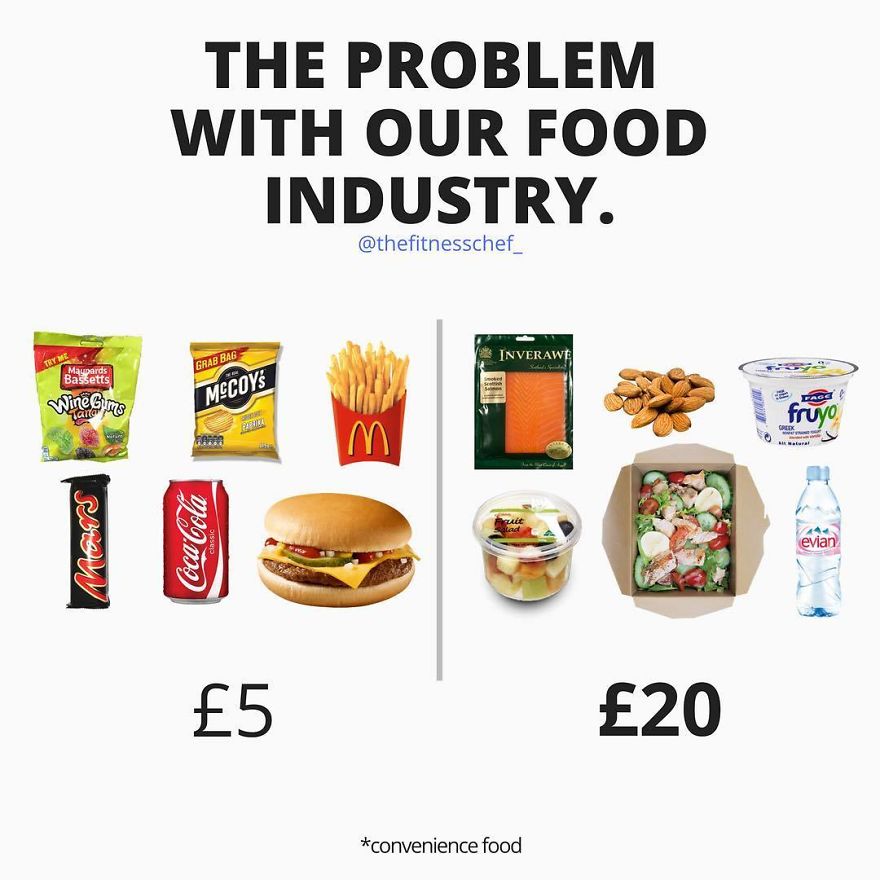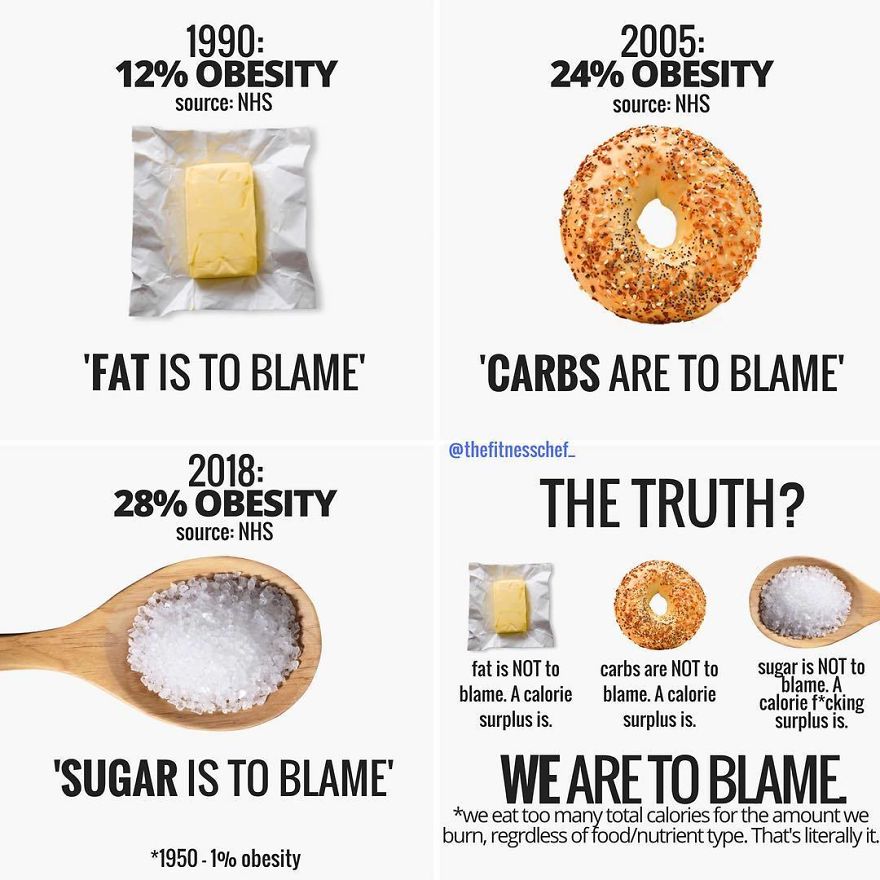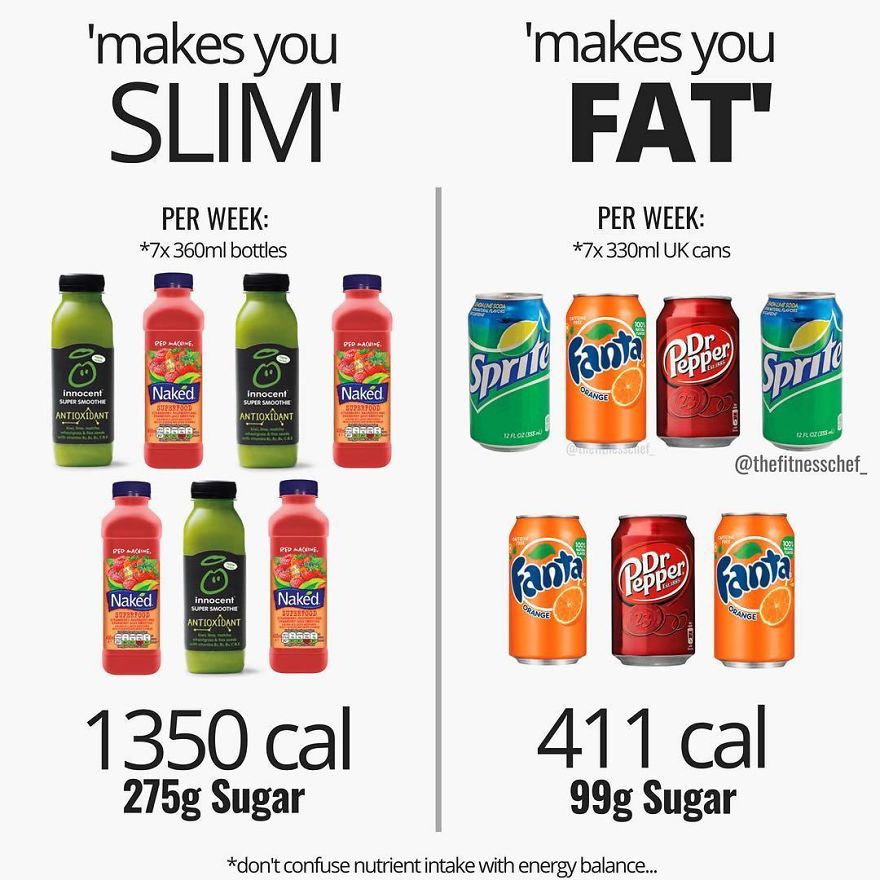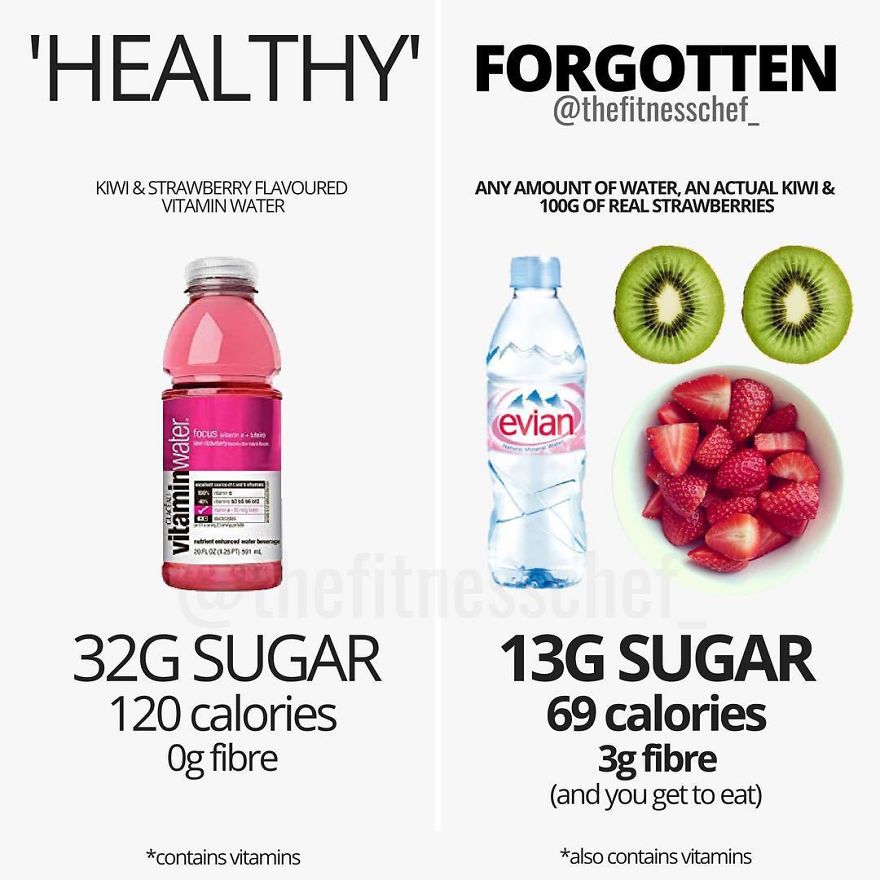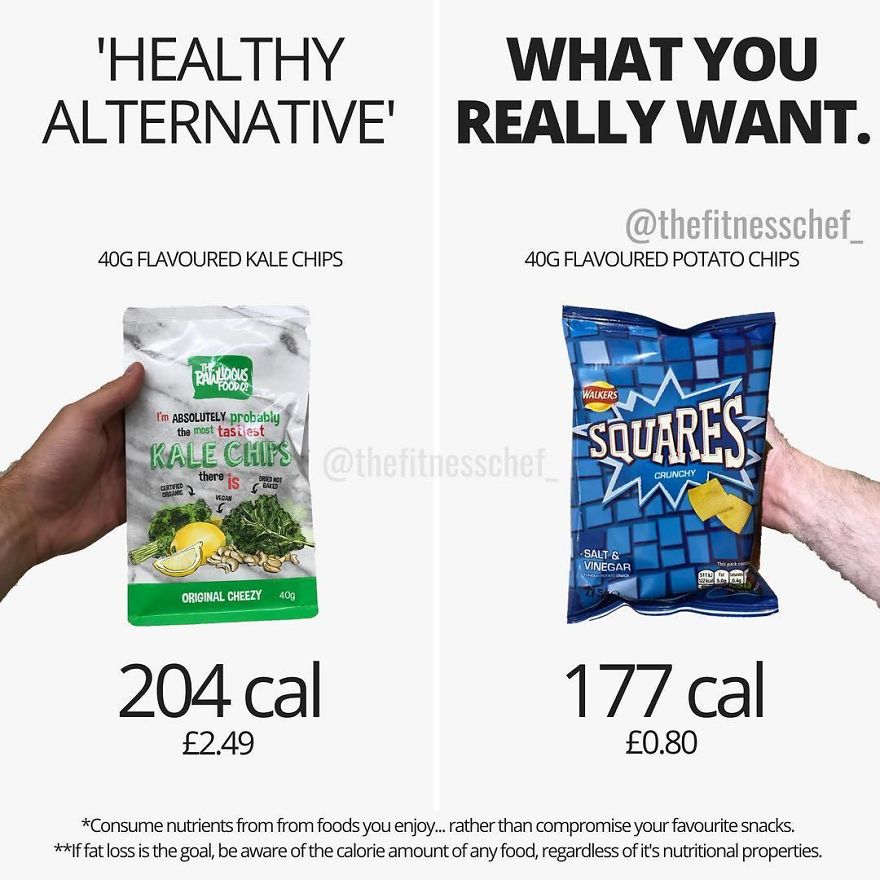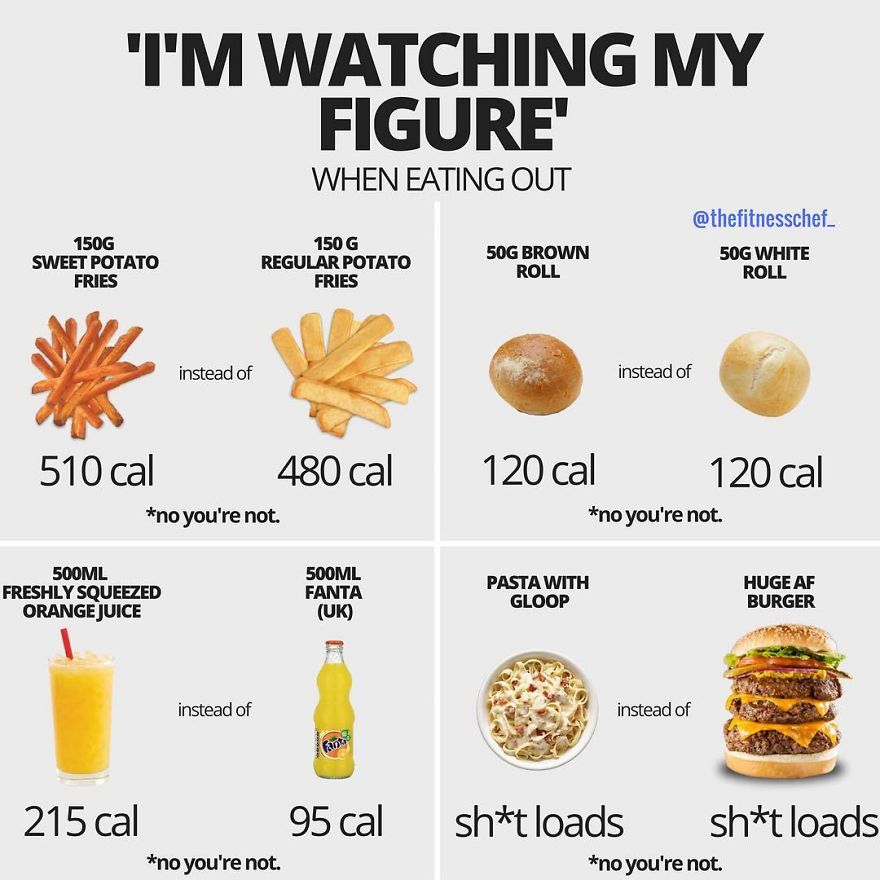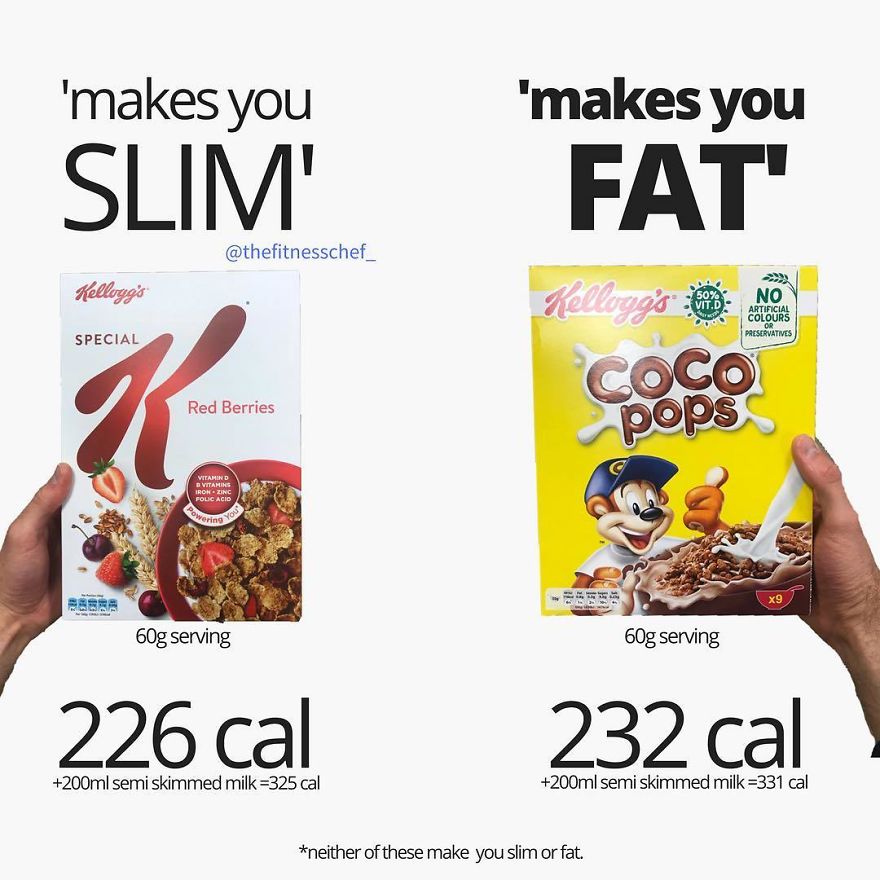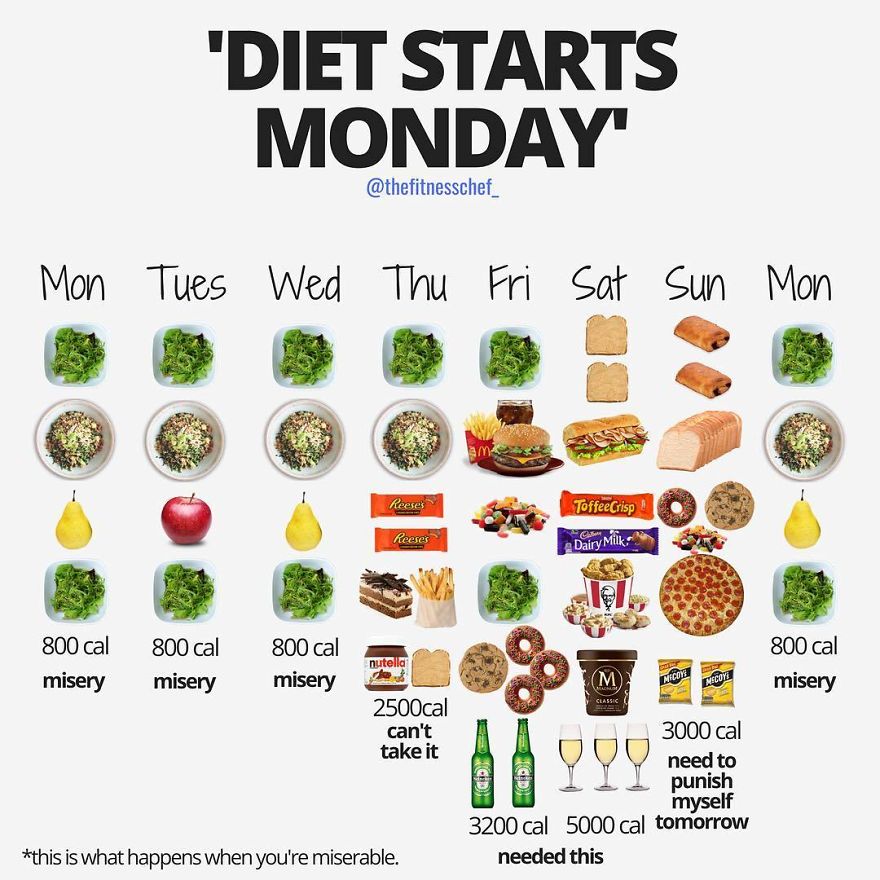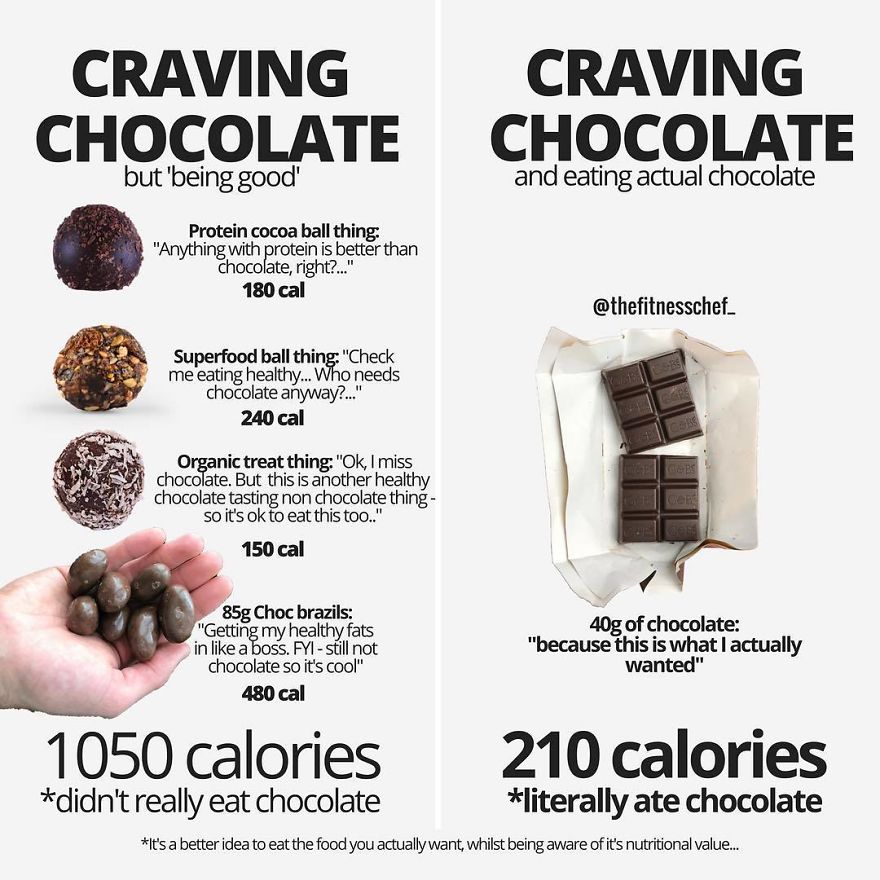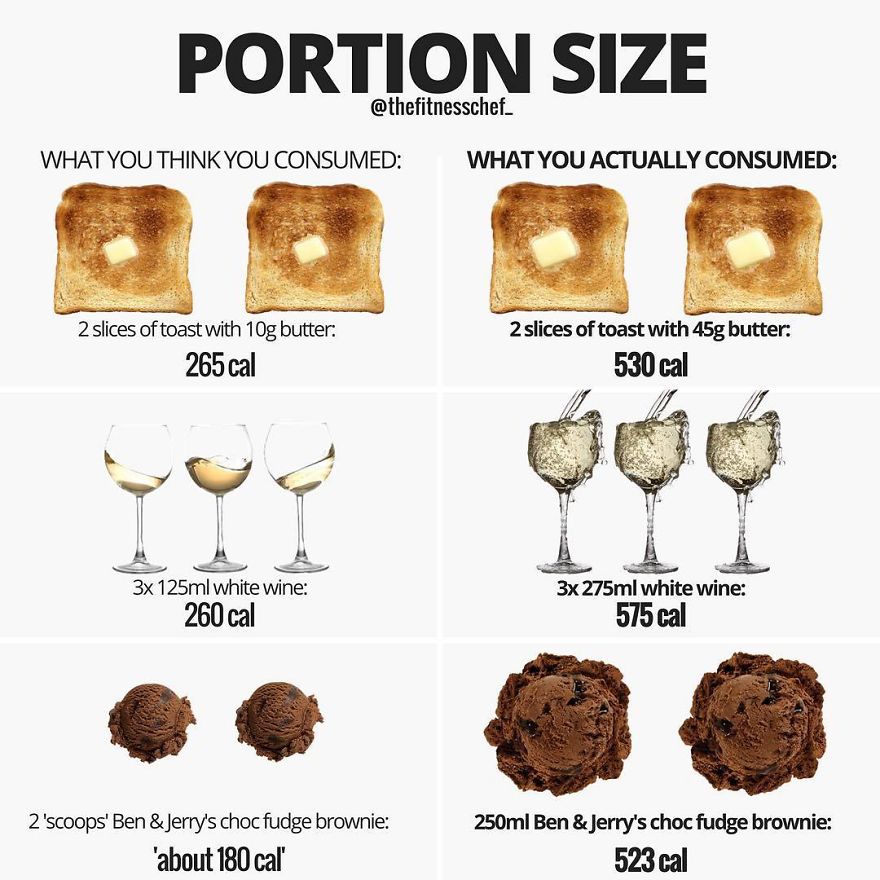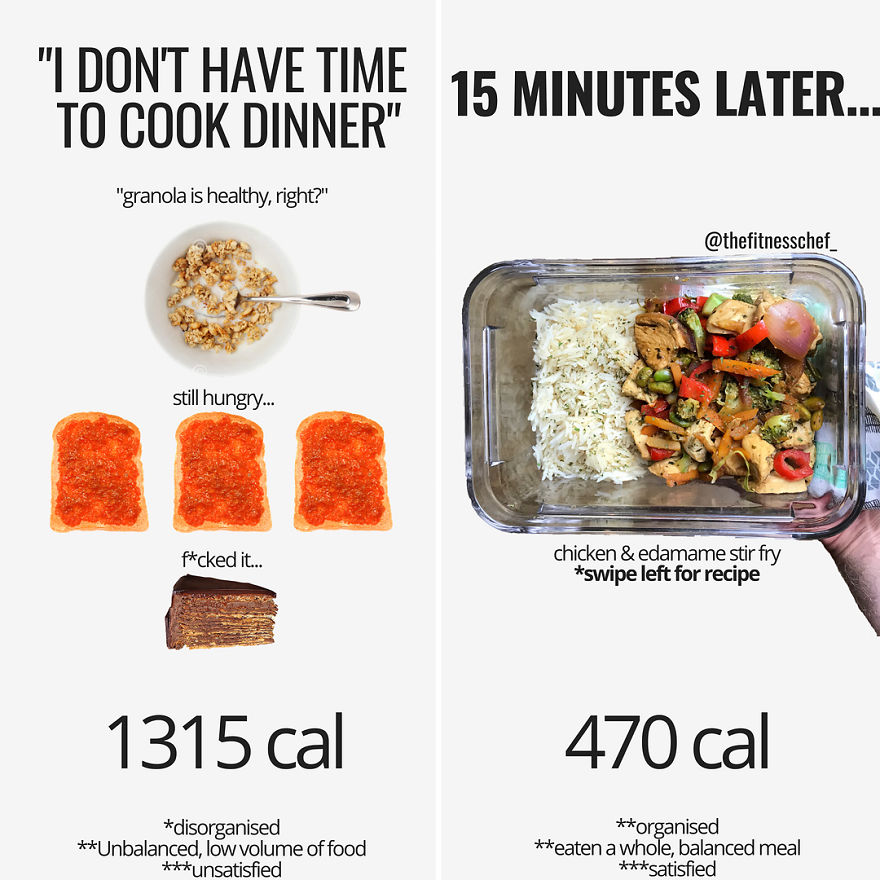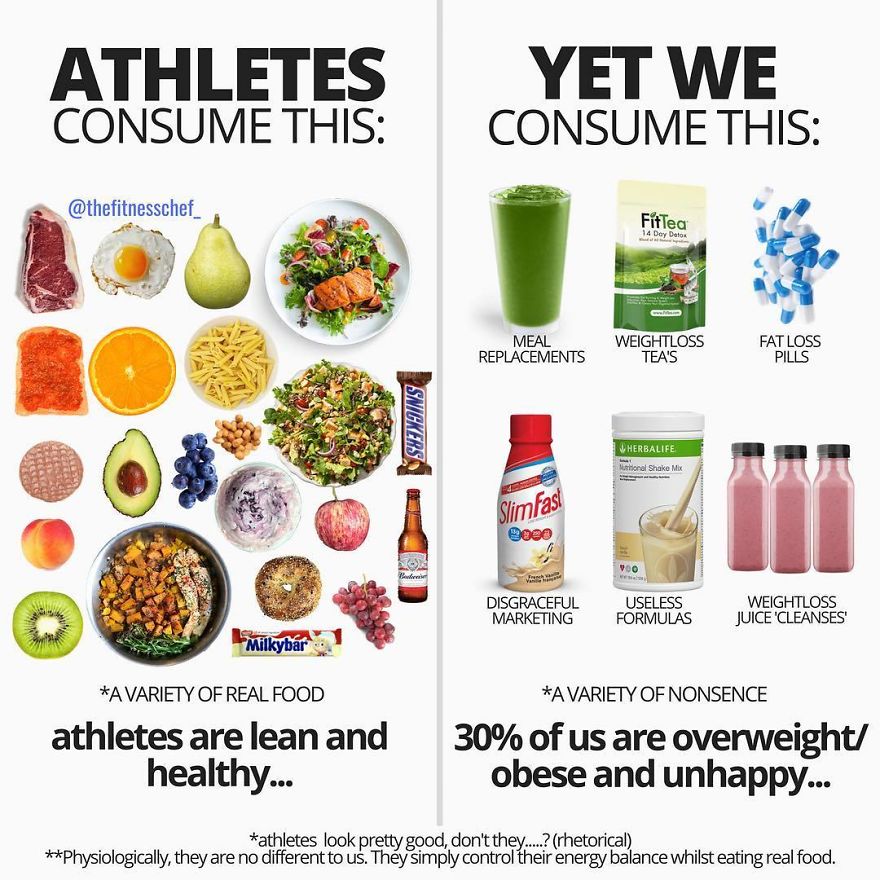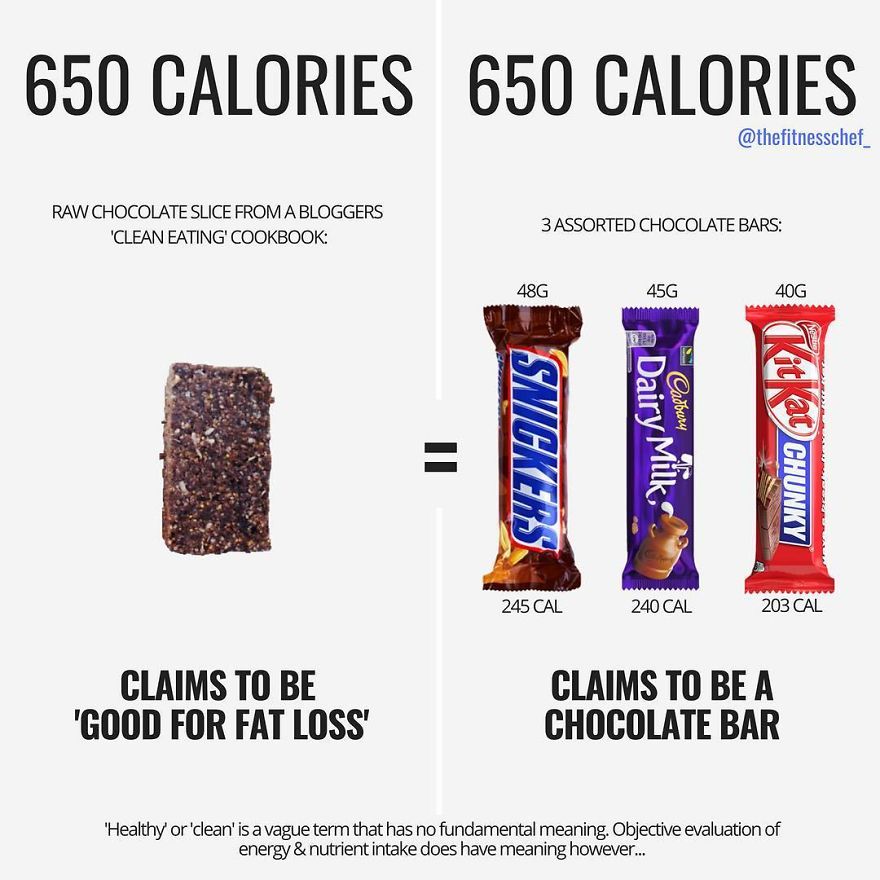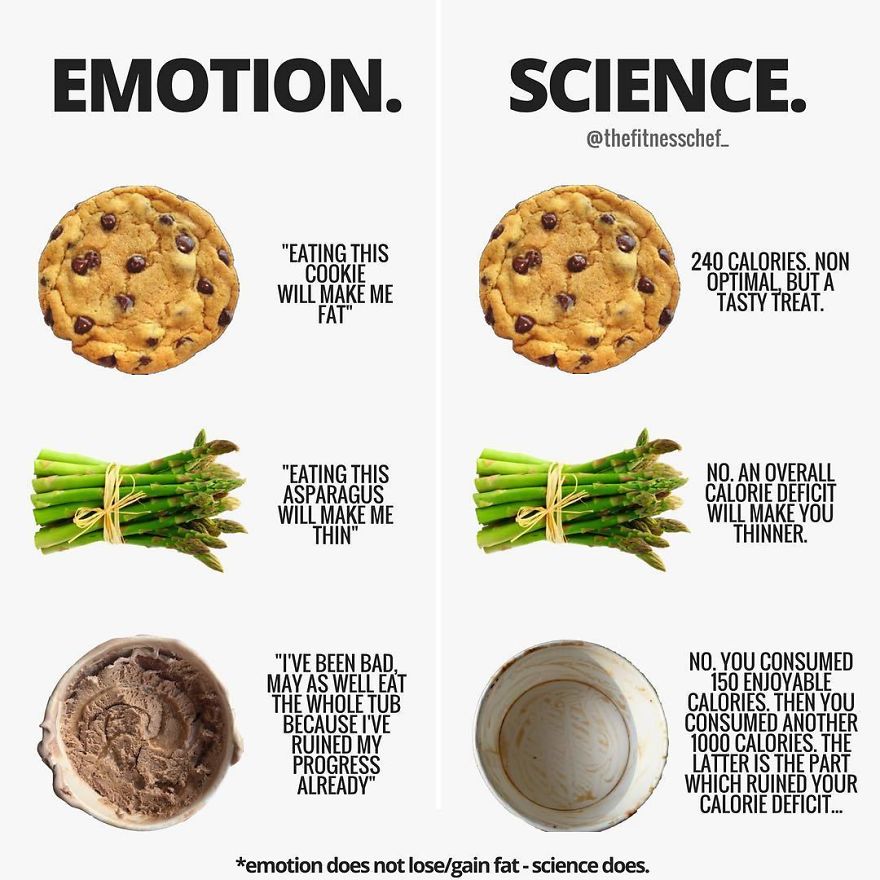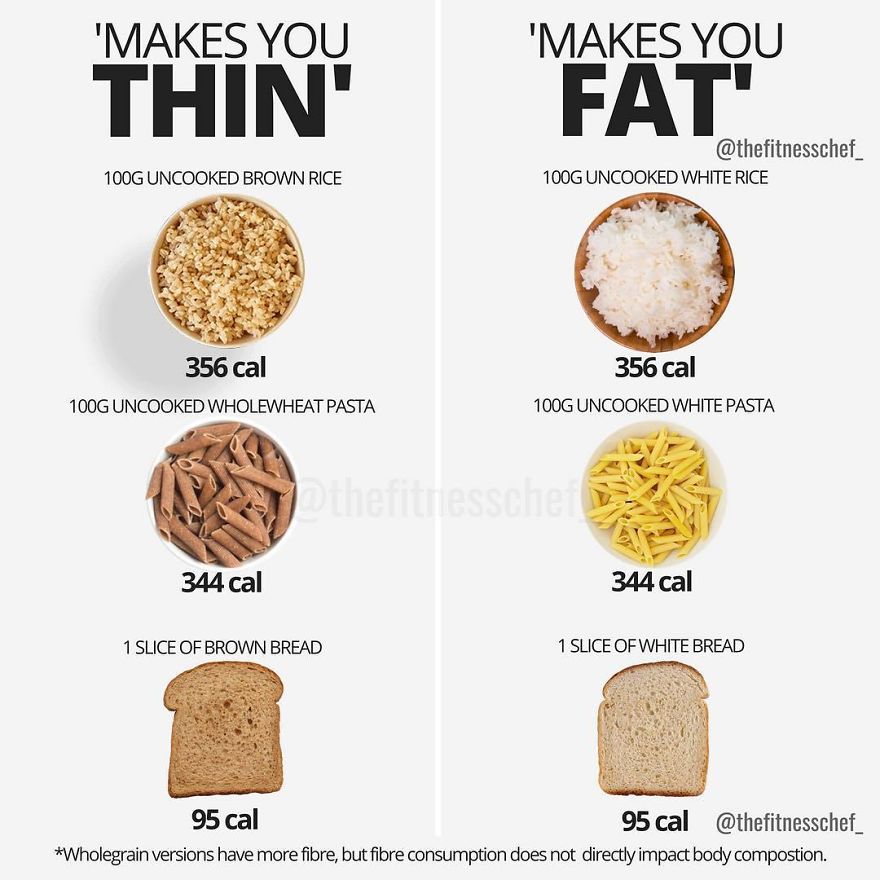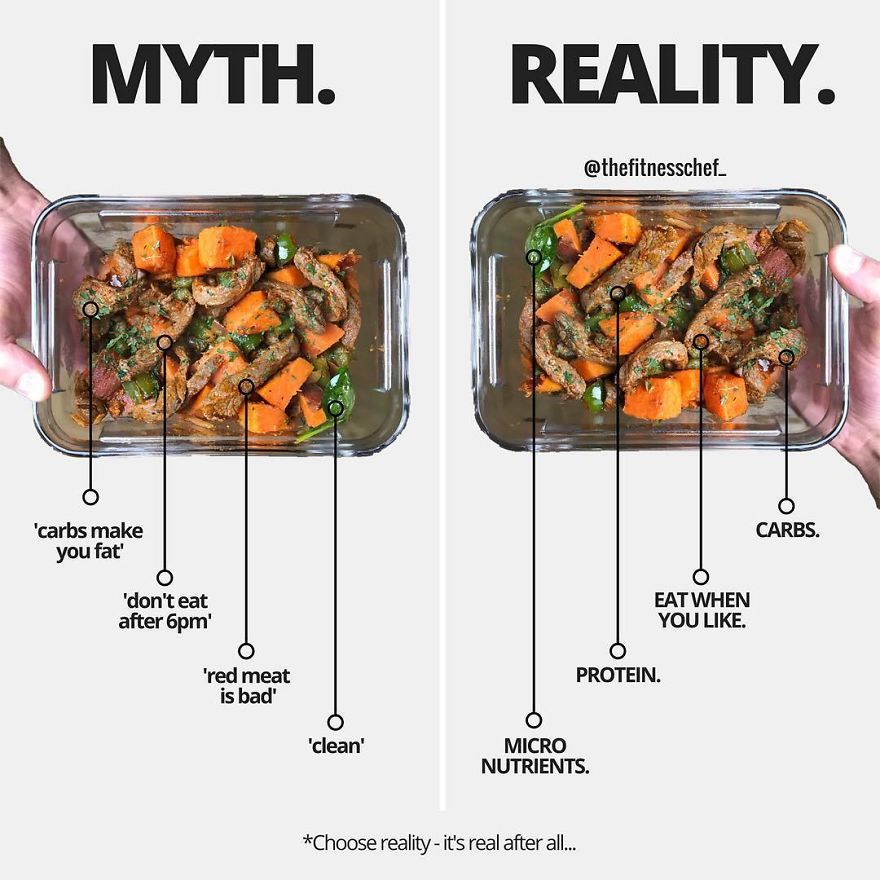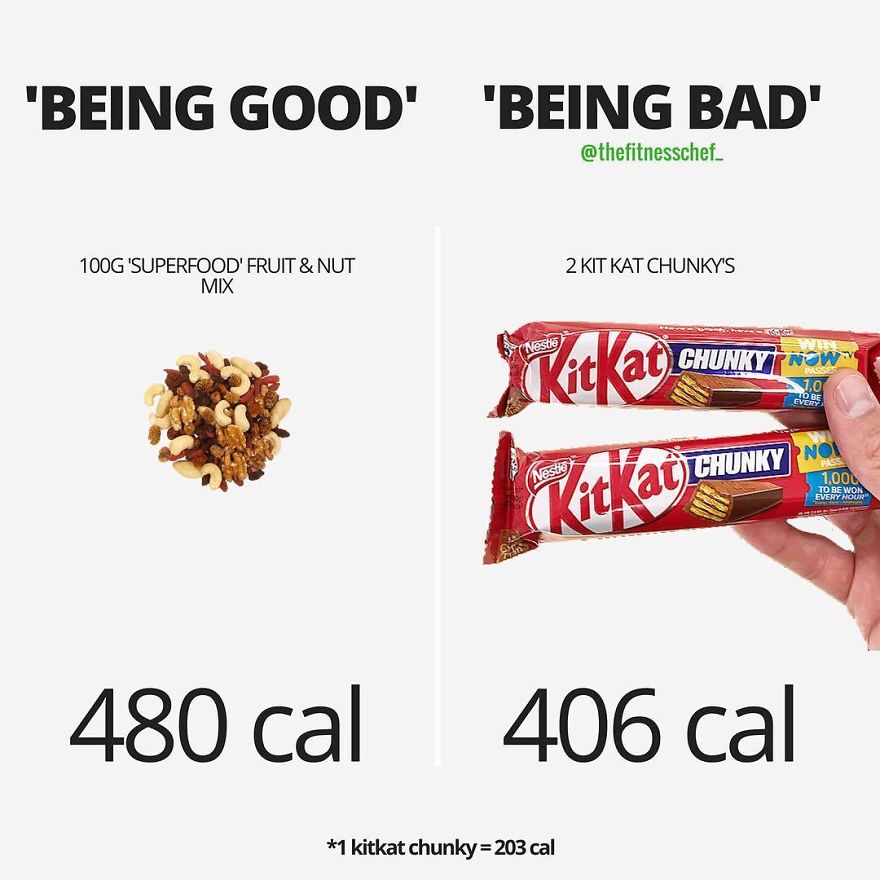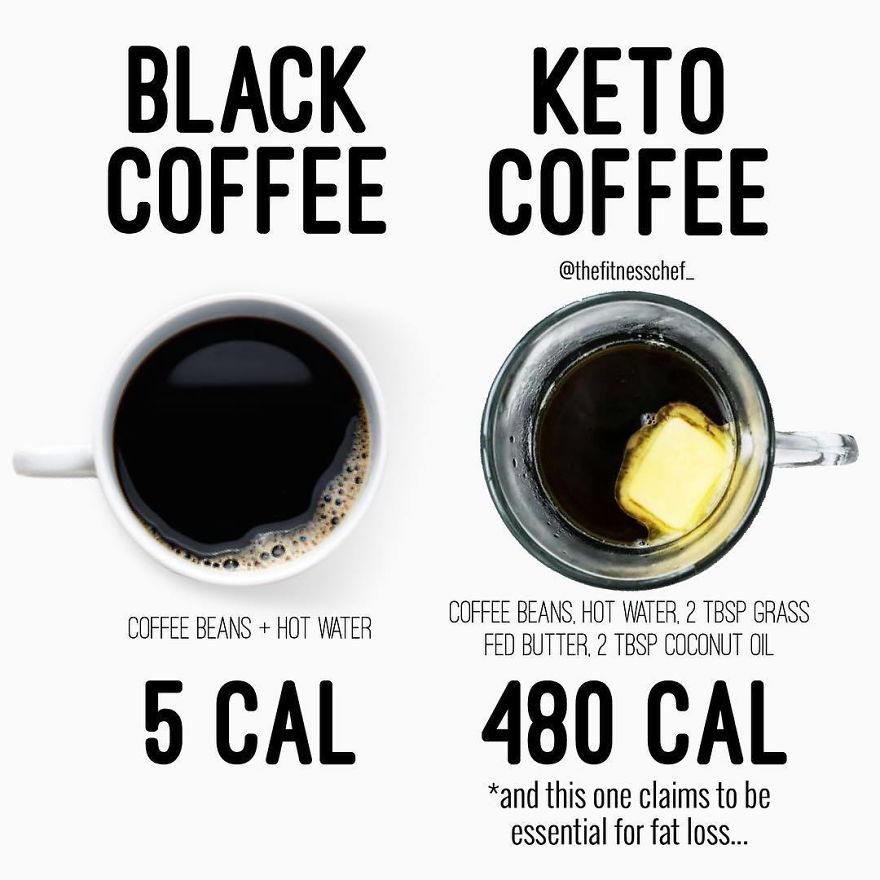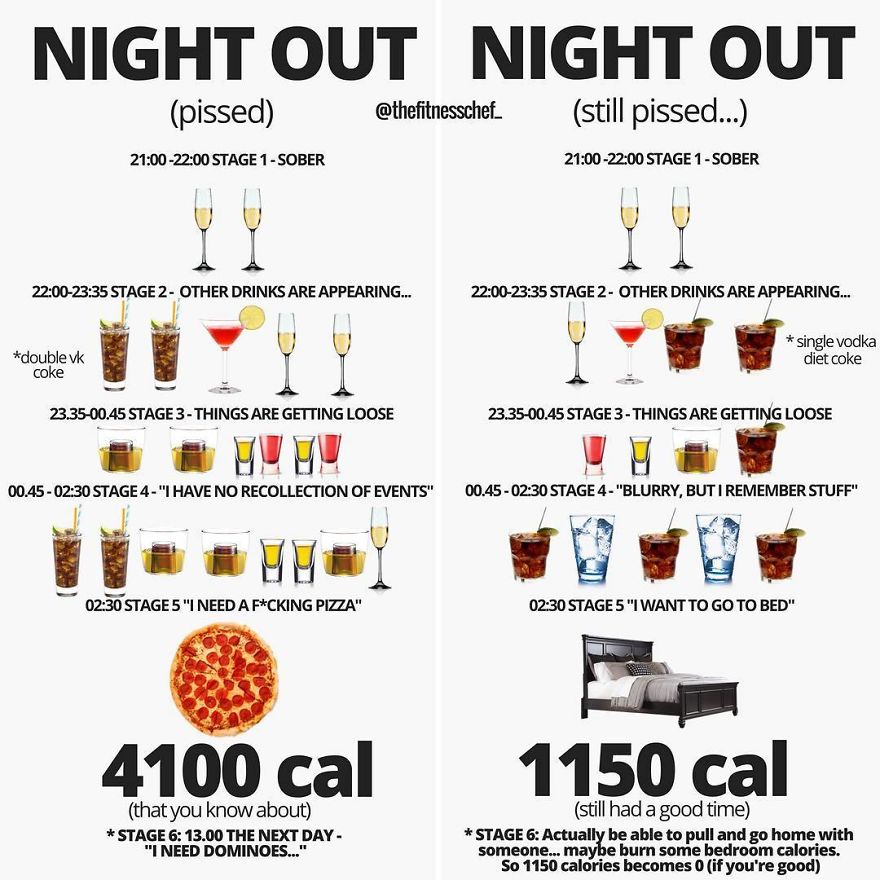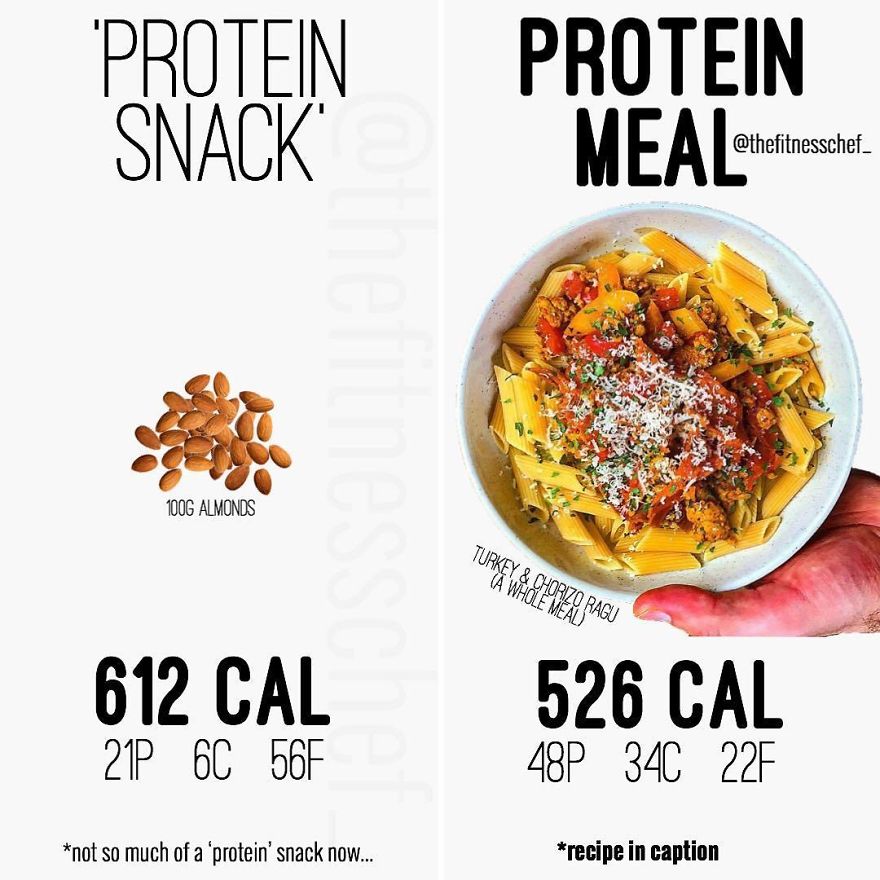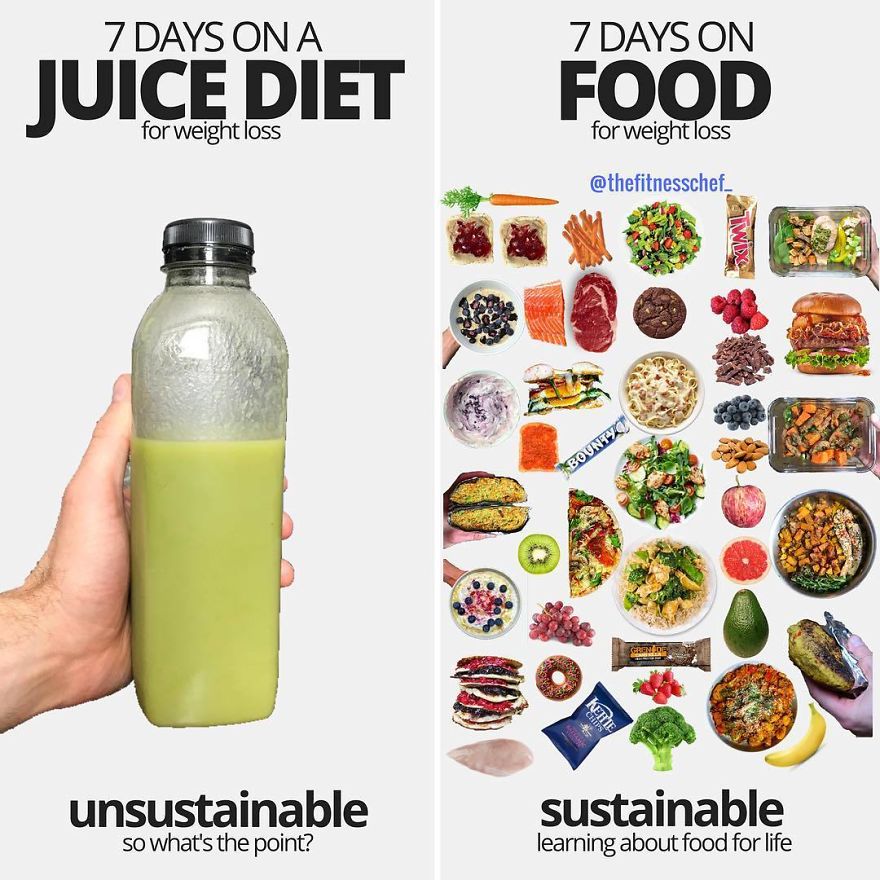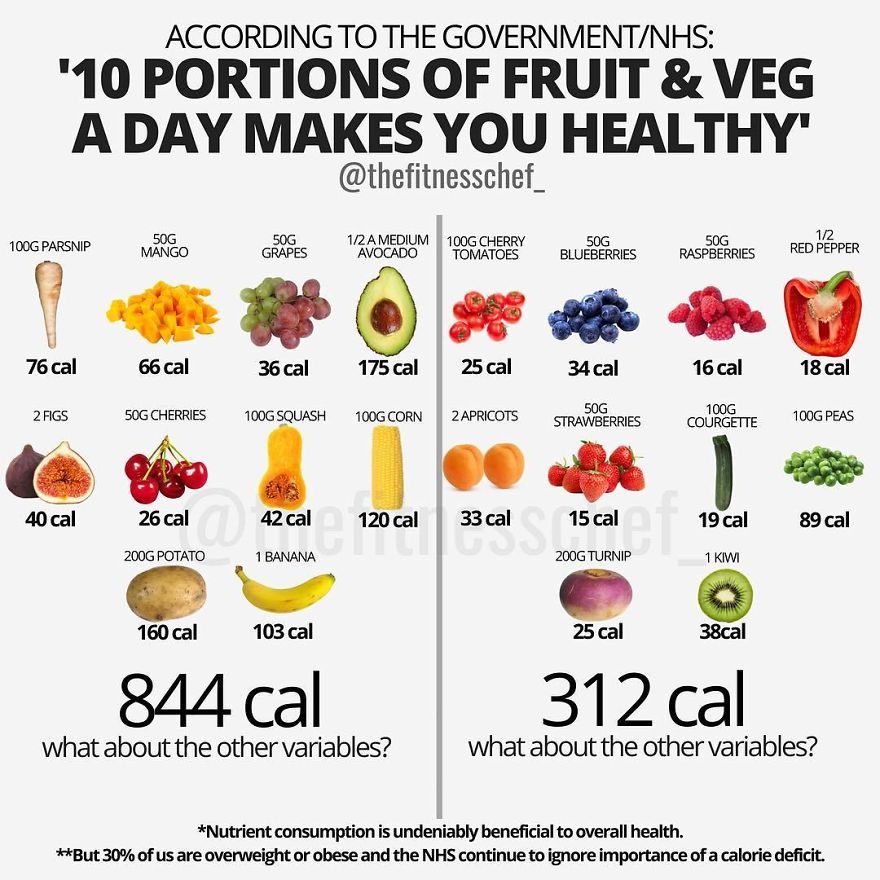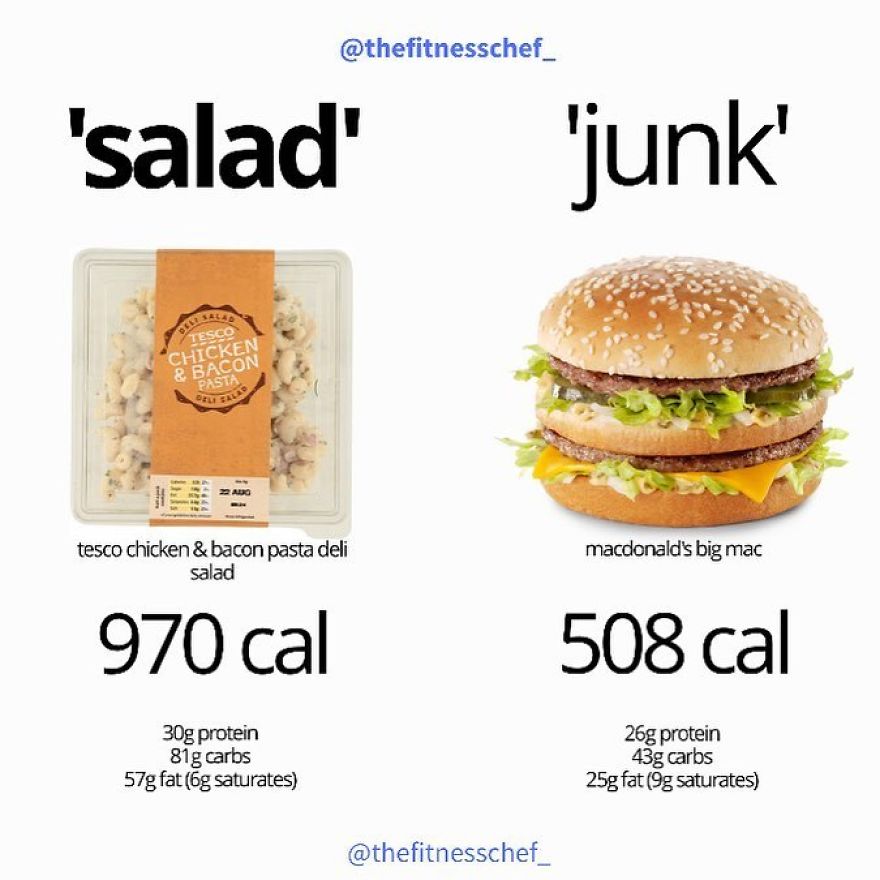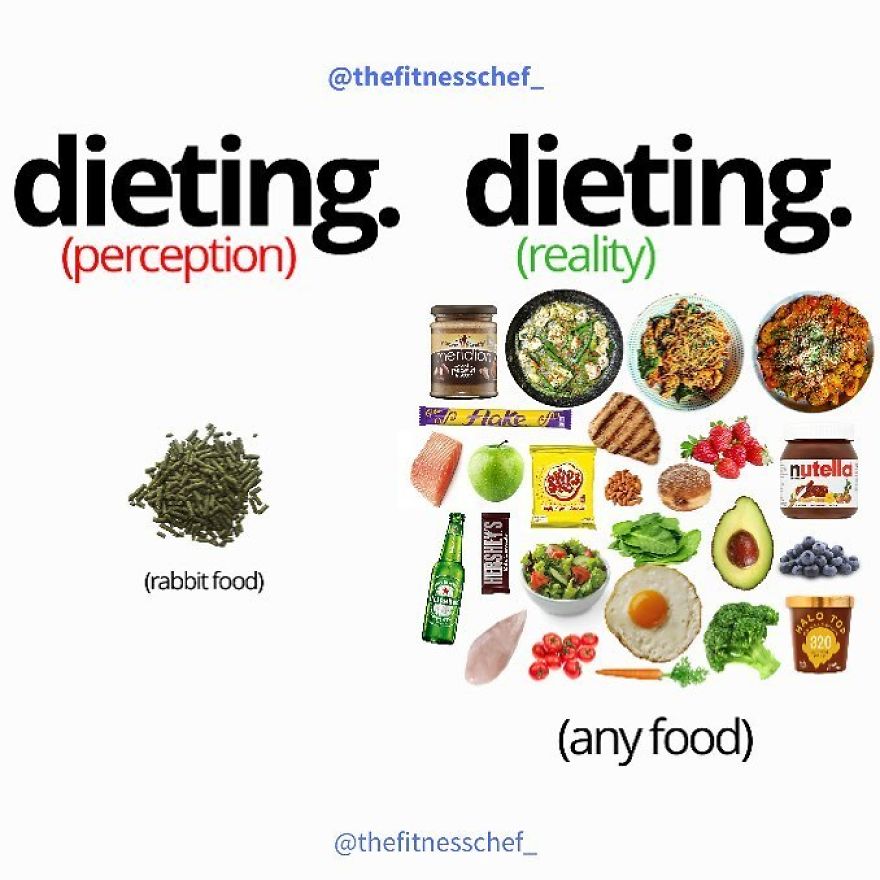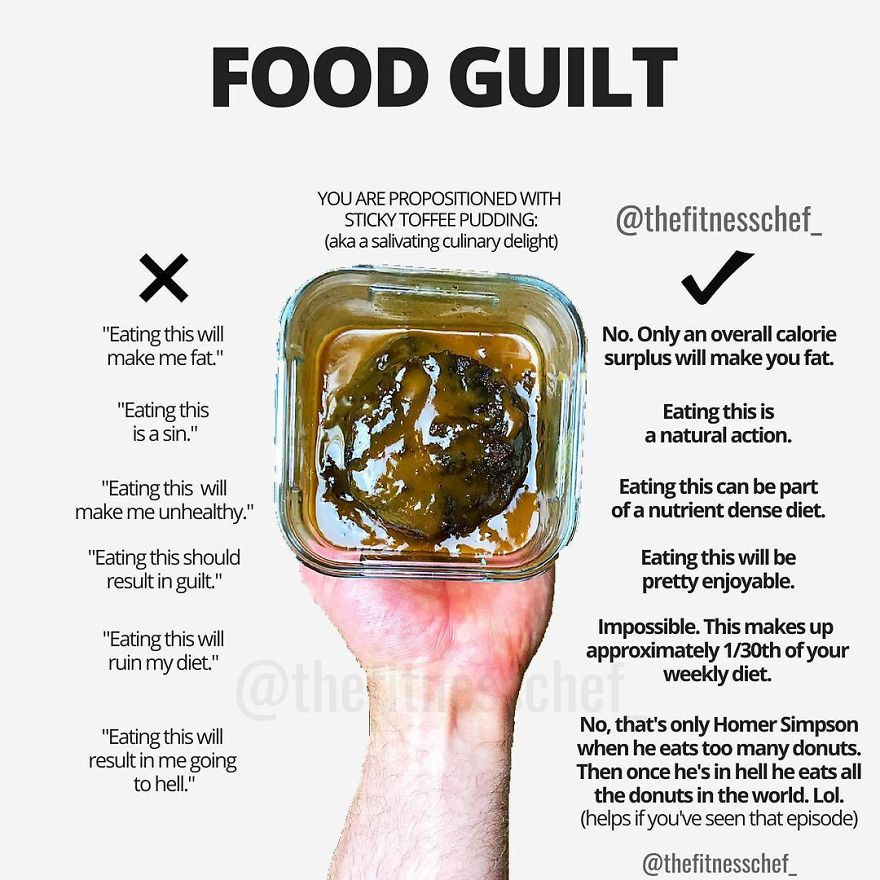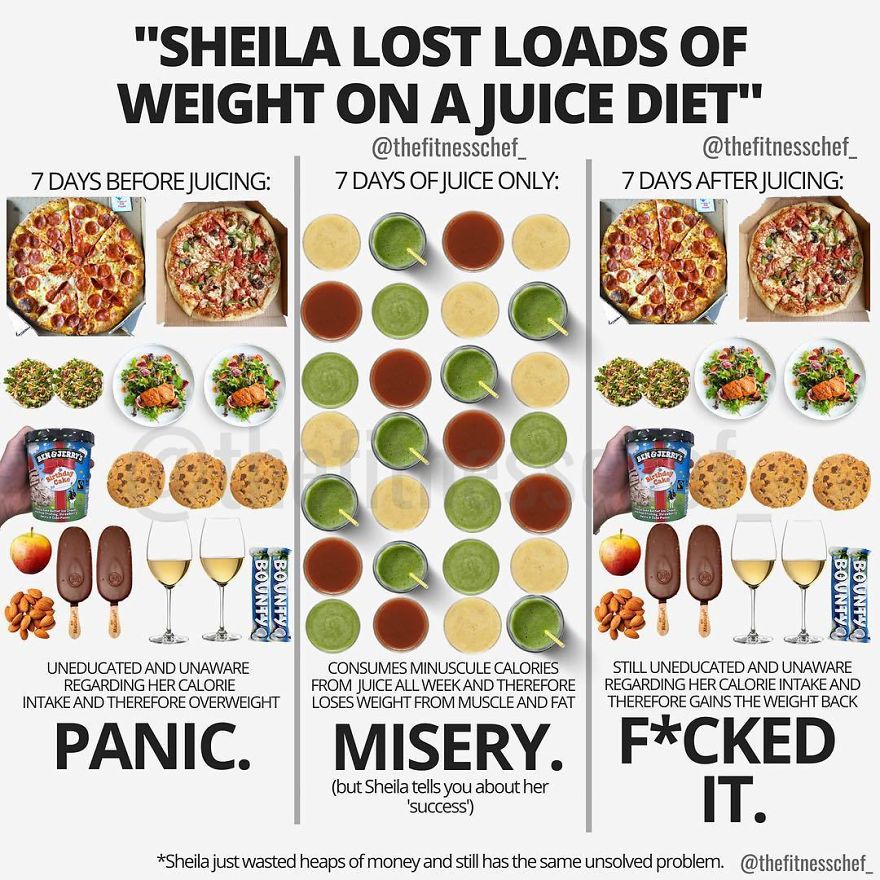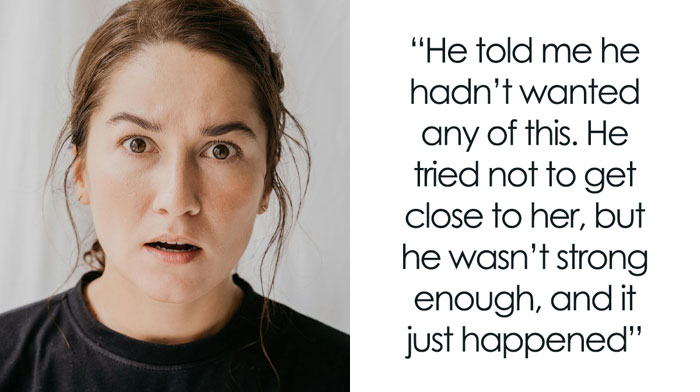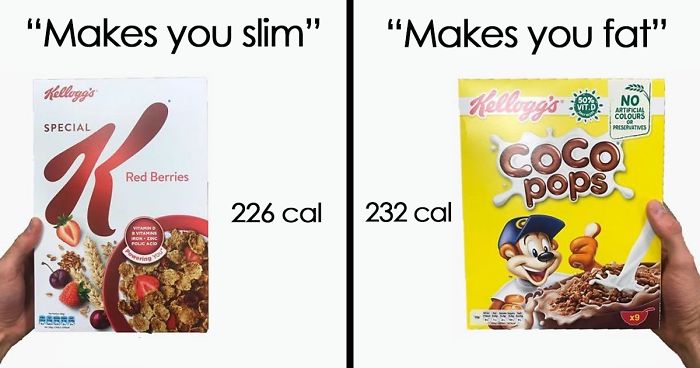
30 Surprising Food Comparisons From A Nutrition Coach That Destroy Dieting Myths – Do You Agree With Him?
According to personal trainer & nutrition coach Graeme Tomlinson, people can lose fat or build muscle by eating foods they enjoy, as opposed to following a restrictive diet. Nutrition, however, is a complicated and tricky topic, and anyone can get confused in the abundance of the information surrounding it. To clear things up, Tomlinson is educating his followers one Instagram post at a time, debunking a lot of popular myths along the way.
"I've been interested in fitness and nutrition since I was young - I used to play semi-professional cricket," The Fitness Chef told Bored Panda. Now, it has already been 5 years since Tomlinson became a professional personal trainer & nutrition coach. The man also creates recipes for Men’s Health.
"The biggest problems that people who are trying to get in shape face are a lack of education and a mirage of false misinformation," he added. Tomlinson thinks that the best way to tackle them is surrounding yourself with evidence-based information. Thus, the motto of his nutrition beliefs, "Evidence-based. Simple. No B.S." Continue scrolling to check out his visual arguments, and you will definitely understand calories a little better.
More info: fitnesschef.uk | Instagram | Facebook
This post may include affiliate links.
Food Industry
It is possible to consume balanced, nutritious food on a budget, but in 2018 it’s becoming ever more difficult when it comes to doing the same with convenience food. This is compounded by the fact that we rely on convenience more than ever - commuting, travel, time constraints etc... Why is there such a price difference? Do supermarkets want us to be unhealthy? Do they want us to get fat? No. It’s down to the increased cost of quality, fresh produce in comparison to cheap, processed, mass made, lower quality produce. Another factor worth considering is consumer demand - our desire to be healthy and eat quality ingredients. Think of it like a fashion accessory... The big question is - how could this cost of healthier ingredients decrease? At which point in the process could a cut be made, if any? Is it a case of saturating shelves with healthier convenience foods and limiting so called poorer quality foods? Would that create the competition which would reduce prices? I doubt it’s viable. After all, people still want/need to make money. That said, Britain is heading towards a staggering 30% obesity rate any day soon...I know one cheap, easy way to get around this. Buy quality ingredients at a good price and sacrifice a couple of hours each week to prepare your ‘on the go’ meals. That way you save money and remain in control.Have I cherry picked the cheapest poor quality foods and most expensive high quality foods? I don’t think so. Selections on both sides account for numerous examples of below and high quality food on the go, where it’s clearly getting more expensive to eat well conveniently... Too expensive for some, which is a great shame. A MacDonald’s cheeseburger is £0.99, whilst the average high quality salad with various meat/fish comes to £6.
Here We Are Again. Talking About Obesity
Here we are again. Talking about obesity. And why it continues to rise in the UK (and the rest of the world). But more specifically in this case, how f*cked up we have become in our proposed solution to it. Irrational cherry picking and outright lies are vomited into our mainstream media every day. The latest installment of the former was last week on BBC 1. Apparently carbs are bad again 😒..In the 1990s, fat was the culprit. Out of all the food groups wrongly demonized, I guess fat makes the most sense as it contains 9 calories per gram and is thus the most calorie dense macronutrient. However, this was/is still an incredibly naive idea. In the early 2000s, carbs were the apparent cause of weight gain. You know... those carbs in the from of cakes, biscuits and pastries.... Yeah, the ones which actually contain more calories from fat😑. What about berries? Obviously lower in calories, but they are carbs too... This one is a joke as it can’t even correctly differentiate the foods it wants to demonize. In the last few years the blame has shifted to sugar - particularly refined sugar. It is not particularly satiating and is easy to over consume - but consumption is still decided by you. Naturally, it is included in sweet, calorie dense foods - so it’s easy to blame I guess
Author is right. Only people are to blame, especially in the UK and the rest of EU, where producers are obliged by law to present ingredients and nutritional data on every processed food product, so the customer knows what he or she is eating. Sure, you can say that 'sugar is to blame' as it is now present in things you would not suspect, but again, it's not the 'sugar'. It is the producer who uses it wantonly and a customer who is not interested what is inside of consumed products. Carbs are not bad, neither are lipids - they are required in a balanced diet. The trick is to balance it in accordance with one's lifestyle (active person can safely eat more sugars that one living a sedentary lifestyle, as they burn them readily etc.).
Here We Are Again. Putting To Bed False Perceptions On Fat Loss
Here we are again. Putting to bed false perceptions on fat loss. The idea that food type defines whether fat loss occurs or not... Describing misplaced concepts about quality ingredients as a means to manage or change body composition..
Consumption of nutrients and quality ingredients is vital for optimal health and there is no doubt that the two juices on the left contain an abundance of nutrients. But they also contain calories and sugar - 1100 of total calories deriving from sugar to be exact. 1350 calories and 275g of sugar in total. I did plan to do this graphic with the zero sugar versions of the soft drinks on the right, but this actually displays my point better. Whilst the drinks on the right are bereft of any nutritional value, seven of the cans combine to 411 calories and 99g of sugar. That’s less than 1/3 of the calories of the ‘superfood’, ‘invigorating’ drinks on the left. In addition, nearly 1/3 of their sugar content.
-
-
If the goal is to alter body composition, every decision you make is important - everything you do means something. This doesn’t mean that you need to worry or be confused as to what you need to do or consume to achieve your goal. It means you need to be objective. You need to understand the basic fundamentals of energy balance and apply that theory to your goal. Consuming 1350 calories from the juices on the left may fit your goal. However, I suspect that consuming such a proportion of calories from a drink each week will not necessarily support your goal as well as consuming water and actual fruit, complete with fibre to help with satiety. Health and fitness is all encompassing. Many parts of it overlap. But don’t get confused with nutrient intake and calorie intake - whilst they are both important, they represent very different things. Ideally you want to be smart and get the best of both facets.
We Know That Hydration And Vitamins Are Two Things Beneficial To Us
Given that their product is named ‘vitamin water’, one would assume that the main benefit of drinking it would be; hydration and consumption of vitamins. We know that hydration and vitamins are two things beneficial to us, so you can foresee the attraction towards such a drink. It’s a drink that should improve our health. In fact, one would be forgiven in assuming that this beverage is a better choice of hydration than water or a fizzy soft drink, due to its inclusion of vitamins. It’s mention of kiwi and strawberry flavour also sounds like it will taste nice. Furthermore, the seemingly normalized confusion between nutrient consumption and calorie consumption regarding fat loss, may lead one to believe that consumption of this drink will be advantageous for a fat loss goal.Here’s what vitamin water really is; a flavoured water enhanced by cane sugar and ‘naturally occurring’ flavourings (whatever that truly means). Per bottle, it contains 32g of sugar, 120 calories and added vitamins. This is where we are in 2018. Despite there being an array of vitamins and fibre from real food, we only take note when it is presented in a shiny, well marketed product. The simplicities of this comparison are as beautiful as they are alarming. Compare the vitamin water to any amount of water and the addition of actual kiwi & strawberries. Less than half the sugar, around half the calories, more fibre, sufficient vitamins, real versions of the flavours you enjoy and you actually get to EAT a reasonable volume of food.
You’re In The Supermarket. You Walk Precariously Down The Crisp Aisle (Or Chips Aisle If You’re American). “Nope, Not This Time! I Need To Lose Weight
You’re in the supermarket. You walk precariously down the crisp aisle (or chips aisle if you’re American). “Nope, not this time! I need to lose weight so I’m going to be good... I’m going to source a healthy snack instead”. 16 minutes later (because that’s how long it takes to find the ‘health foods’ aisle), you are faced with an assortment of products. And there they are. Kale chips. In your determined mind you join ‘kale’ and ‘chips’ together to conclude that this is THE perfect alternative... You’ve heard kale cures obesity on instagram, whilst the inclusion of the word ‘chips’ has you salivating at the prospect of actual chips...You’re at the checkout. £2.49. “Wow... these better be good.” You open the packet. The packet is EMPTY. “No, wait... there’s a few at the bottom... making up approximately 1/10 of the size of the packet. You’re already knarked off. You taste them. Now you are overwhelmed with anguish, despair and eternal doom. And this is despite being unaware that you just consumed more calories than you would have if you chose what you actually wanted to eat in the first place. Micro-nutritionally, these kale chips are far superior to most potato chips. They contain the nutrients from kale and cashew nuts. But here’s the thing. The ‘healthy’ choice you made for fat loss becomes redundant if that choice exceeds the calories of the original choice. Yes, you’ve just consumed some micronutrients and monounsaturated fats (both good for long term health), but you also consumed more calories (at an extortionate price). If your diet is already balanced and effective, you should be consuming the bulk of these nutrients with main meals anyway. A good overall diet is a flexible diet. Rich in variety, nutrient intake and consumption of less optimal foods you enjoy in moderation. Eat your potato chips - but understand what that means.
Nutritionally Speaking, Snacking On Fruit Is Better Than Snacking On Processed Foods Of Less Nutritional Value For A Multitude Of Reasons. Nutrients. Hydration. Fibre. Vitamins... To Name A Few Reasons
Nutritionally speaking, snacking on fruit is better than snacking on processed foods of less nutritional value for a multitude of reasons. Nutrients. Hydration. Fibre. Vitamins... to name a few reasons. However, the term ‘fruit’ should not be confused with ‘dried fruit’ or further modified fruit such as these banana chips. This is because the calorie and sugar properties can be very different from the fresh versions. Why are the banana chips SO much higher in calories? Well, it’s a very simple answer. Fresh banana gets 70% of its weight from water. Whereas dried bananas lose around 95% of water content, making them a far more concentrated calorie source. Essentially, per 100g, you’re eating the calorie worth of what would be a LOT more fresh bananas. The same applies to all dried fruit. Banana chips are also different from dried banana. These chips are dehydrated, but also coated in oil and contain additional sugar, making their calorie/sugar content even higher still. Snacking on fruit is great. But you still have to be smart about it. If weight loss or reducing sugar intake is your goal you are better placed to consume fresh fruits, rather than dried or modified.. So called healthy foods still need the same level of awareness. They contain calories and sugar, just like any less nutritious food does. It’s this type of blind consumption without awareness that could stall fat loss progress or lead to insulin related health problems. Simply defining all forms of fruit as a good option is slightly short sighted. As you can see, gram for gram the differences can be astronomical. “But I snack on fruit”... yes but you also snack on calories and sugar. Therefore is might be a better idea to get clues up on the nutritional values of the food you consume. The likelihood is that you’ll source fresh fruit, lower in calories (and sugar if that’s a concern)
Wine Is Not Bad. It Can Be Enjoyed As Part Of A Fulfilling, Healthy Diet
Wine is not bad. It can be enjoyed as part of a fulfilling, healthy diet. In fact, a glass of wine each day can possibly fit the same statement.But here’s the thing. For fat loss, I always advise a gradual and sustainable calorie deficit - usually 10-15% from maintenance. For example if 2500 daily calories maintains your current weight, shaving off 10% leaves you with 2500-250=2250 calories per day to hit that 10% deficit. If we put daily consumption of a glass of wine into this scenario of daily, weekly and monthly calorie intake geared towards fat loss, this one glass could actually negate a big chunk of your calorie deficit. The question is; Do you really need it? Furthermore; Do you even track it?
When Eating Out (And Eating In General) There Is A Plethora Of Misconceptions Regarding What’s ‘Good And Bad’
When eating out (and eating in general) there is a plethora of misconceptions regarding what’s ‘good and bad’. This results in the inevitable unnecessary elimination of the food you want, for something you’ll tolerate because you hear it’s ‘healthy’ aka ‘supports’ your goals. The problem is that most of the time, you simply don’t know what you’re consuming. For example; unless you enjoy it more, choosing brown bread over white is as pointless as choosing sweet potato fries instead of regular fries (unless you prefer SP fries). More fibre you say? How about you take care of your fibre intake with your overall nutritional intake instead. After all, you go out to catch up with friends, have fun. You don’t go out to stress profusely about decimal points of fibre intake (hopefully). Consumption of one mildly excessive, non controlled meal out of 20-25 meals each week will not impact progress unless you eat out several times per week - then the lack of knowledge as to what you are consuming may become an issue. It’s surely a better idea to, when out, order what you want when out and enjoy it. Then focus on your goal with controlled, measured intake of calories and nutrients the rest of the week (about 95% of your intake). It’s called balance.
Special K. The ‘Healthy’ Cereal That ‘Makes You Slim’
Special K. The ‘healthy’ cereal that ‘makes you slim’. There was a time a while ago where Kellogg’s created the special K diet for those looking to lose weight. ‘Drop a jeans size in 2 weeks’ I believe it was called...The concept was that you would eat special K suggested cereal servings/special K protein bar for breakfast and lunch, followed by a ‘normal’ meal for dinner (so this could literally entail ANYTHING... aka HEAPS of calories). I talk in the past tense as this is surely no longer a thing... I hope. The thing is. Whilst consuming vermin sized portions of Special K will naturally create a calorie deficit, so does eating any food, as long as you consume less energy than you expend. Maybe Kelloggs should create the same diet with their coco pops? Because exactly the same results would be achieved (nutritionally they are basically equal). But it’s the power of marketing, words and human vulnerability which run true here. This results in many perceiving the product on the left as ‘good’ for losing weight, whilst most people believe the product on the right will be inherently ‘bad’ for weight loss. But the reality is that neither are good or bad for weight loss.Weight loss can only occur if you are in a calorie deficit, regardless of food type. This example is indicative of MANY foods/products which market themselves as a food which makes you lose weight. It’s not the type of food that does the job, instead it’s the quantity of food.
Mindset Is Key To Long Term Success At Anything
Mindset is key to long term success at anything. This includes improving aspects of your diet and losing/gaining weight. If you’re miserable doing something voluntarily, naturally you will not last long. You might force yourself for a while, but ultimately things unravel. Just like the above restrictive diet does. Changing processes in order to cause change is good, but understanding these changes is even better. Fat loss requires a calorie deficit, but it also requires you to be in a deficit consistently over a period of time. To stick at something consistently for a period of time you have to enjoy it and experience a degree of success. It’s about long term averages. The above example is indicative of the impatient ‘all or nothing approach’ where the rational concept of averages is ignored. Unsurprisingly, this type of dieting reaps no progress. In fact, given the heavy intermittent calorie excesses, it maybe causes regress. Instead of viewing your diet every Monday as a punishment to your weekend of excess (which was brought about by the previous week’s punishment), isn’t it a better idea to learn a little about energy balance, basic nutrition, how your favourite foods CAN fit into your diet each day and begin enjoying the process? That’s surely not too much to ask of yourself.... Stop being miserable. Start enjoying a pragmatic, goal supportive diet that you can enjoy every single day
Chocolate
Chocolate is the example here, but this post is representative of any foods you might label as BAD. If you’ve banned calorie dense foods it’s likely that your goal is fat loss. And if you forbid yourself from eating certain foods as a means to lose fat, you probably don’t grasp that it’s the quantities that are important. Otherwise you’d understand that these foods CAN be consumed in moderation. Naturally, with this ‘good/bad foods’ mindset, it is extremely likely that you won’t measure the quantities of the ‘healthier’ food you choose either. Therefore the ‘good’ food is also likely to go unmeasured in terms of calories. As calories in vs calories out determines body composition, not knowing becomes a problem. As you can see on the left of this graphic, many of those so called ‘better’ alternatives are also calorie dense. In fact, some are significantly higher in calories than the desired food. With this same mindset of good and bad, you believe that you can eat lots of them - that no harm will be done. But when you consume over 1000 calories on alternatives to chocolate, all of a sudden the reason you didn’t eat a chocolate bar becomes redundant. Being oblivious to calorie intake is no use for fat loss. -
- “But what about the nutrients Graeme... and the protein & fibre etc”. Well, I would advise that it’s better to source your nutrients and fibre from main meals, not tasty snacks. This leaves you with the freedom to include non nutritious foods you enjoy in moderation if they fit your required calorie intake. Nutrients are important for overall health, but when that means you spend £10 on fashionable, calorie dense alternatives, which results in oblivious consumption of hundreds more calories than the original, it’s probably better to save your money, enjoy some chocolate and learn to understand how a calorie deficit works
‘But Measuring Portions And Tracking Calorie Intake Is Boring Graeme’. Yes, It Is
‘But measuring portions and tracking calorie intake is boring Graeme’. Yes, it is. But for all of the 4 minutes and 32 seconds it takes you each day, it could literally be the difference between fat loss progress, no progress or even regress. ‘But who measures butter to the gram Graeme?’ Well, you. A couple of times only... Then after this you’ll hopefully be able to eye ball it. The whole point of tracking is to educate you for the future, not punish you in the present. If you do track portion sizes of food as a means to measure your fitness goal, it needs to be accurate. If it isn’t it becomes somewhat useless. Whilst it’s not completely pointless and there is some awareness, as you can see, it is easy to underestimate or carelessly miscalculate portions. Whilst this isn’t really a problem for low calorie foods like vegetables, it can be with calorie dense foods. The calorie difference upon erroneous judgement is much bigger with calorie dense foods. Paying attention to the types of food you consume is important for overall health, but it’s the QUANTITY which matters most when it comes to fat loss, maintenance or weight gain. After all, body composition is completely determined by calories in vs calories out.
Time. The Thing We Apparently Run Out Of In Abundance
When it comes to anything in life, convenience is useful and speed is helpful. These two things also apply to preparation of calorie/nutrient intake to fit your goal. Convenience and speed can help the process. But when somebody constantly says they flat out do not have 15 minutes per day to prepare a meal that will support their goal, they are full of sh*t. They really mean they don’t want to cook. They are not prioritising their goal. I once had a client who claimed they couldn’t cook. It was a hardship to them. If they did cook, they’d make the same meal over and over again. They bought extortionate ready made fitness meals to solve the problem, which unsurprisingly became financially unsustainable. The result would sometimes be a whole chocolate cake for breakfast. I’m not joking.
I Wonder If Usain Bolt, Sir Mo Farrah, Serena Williams... Or Roger Federer Have Ever Sipped Fit Tea...
I wonder if Usain Bolt, Sir Mo Farrah, Serena Williams... or Roger Federer have ever sipped Fit Tea... Or marveled over the marketed wonders of Herbalife... Perhaps after a gruelling session they’ve considered swapping out a nutritious meal for a glass of slim fast...? Of course they haven’t. Whilst the diets of the athletes above may vary, they all consume real food. We idolize these people and believe their sporting abilities make their biological make up different to ours, but they are actually the same as us. Whilst their technical abilities, skill and conditioned fitness is far superior, they also have to monitor and control their lifestyle to fit their goal - just like we do. Whilst eating a variety of real food, an athlete’s balance of calories consumed will be controlled in relation to the amount of calories they expend. This doesn’t mean that we have to turn our life upside down and take up athletics or tennis. It means we have to be smart enough to realise that the principle demonstrated by most athletes is all the evidence we require. The products on the right of this graphic have no relationship with the fundamentals of our biology. They do not nourish, do not do anything that a calorie deficit doesn’t already do, do not alter thermodynamics and do not cleanse us. They do however, cost a lot of money and propose an experience which is simply; unequivocal bullsh*t
Guilt Free Vs Guilt Free
The nakd bar on the left markets some of its products as ‘guilt free’. This is absolutely correct. In fact, I like this. Why on earth would you feel guilty after consuming food? After all, we need energy to live. It doesn’t make sense to feel guilty doing something completely natural such as consuming food. However, this statement and very concept of ‘guilt free’, means that there must be foods that are not guilt free, right? There must be foods that you should feel guilty about consuming, right?Perhaps three of these Reese’s peanut butter cups? No ‘guilt free’ marketing in sight... High calorie...? High sugar...? Chocolate...??? Is it bad for you? If you eat it, should you be ashamed? No. It’s thought of this way because it’s never marketed as healthy. But it’s still food. Instead it’s seen as a vice - something you really want/enjoy but shouldn’t really have. When it’s consumed, for some strange reason you feel guilt. Then negative relationships with food are born, instead of seeing it for what it is - food.
The ‘Clean Eating’ Trend Has Dominated Social Media For A While Now
The ‘clean eating’ trend has dominated social media for a while now. Today, most health conscious recipe books fall under this categorized notion that; ‘eating clean food will make you lean’. Whilst the recipes will be excellent for an individual looking to consume more nutrients, there is an issue facing an individual who wants to lose fat (or do both). Where the recipes and support will be inspiring and educational to a degree, there is a distinct lack of focus on the direct cause of the individual’s problem - energy balance. These recipe books often fail to display the basic calorie amounts for each recipe, instead claiming that consuming nutritious ingredients alone will get you lean. This doesn’t cut it I’m afraid.
If I'm going to sit down and consume 650 calories, whatever IT is, it better fill my plate and leave me full for 4 to 6 hours.
‘Emotional Eating
‘Emotional eating’. The thing is though - when it comes to body composition, no matter what process you choose and how you execute it, any change which occurs is the result of science (thermodynamics). Whilst we cannot change the course of science, we can change our emotions to influence the scientific process. The feelings we get which result in turning to excess food for comfort can be eradicated by choice. We can literally choose to do this. We control our emotions, they do not control us. We need to be stronger. Take eating a cookie or a moderate amount of ice cream for example. In your head you might tell yourself that eating a cookie or ice cream is bad (but you love them). Now that you’re already bad, why not eat 4 cookies, or a whole tub of ice cream? The reality is though, that this particular cookie is 240 calories and this moderate amount of ice cream is 150. What does that mean for your fitness goal? You tell me. But I estimate that it could absolutely fit into your diet, regardless of your goal. Eating this cookie/ice cream is one tiny episode in your life. It’s a small part of your overall lifestyle which defines your goal. Your execution of energy balance, nutrients absorbed, bodily function is science. So is the effect of 240 calories or 960. 150 calories or 1000. You literally make these choices. Be objective.The principle of the paragraph above can be used for the asparagus too. Consuming a nutrient dense, healthy food will not automatically achieve your fitness goals alone. Don’t fall into a false sense of achievement - you merely ate a food here. What does the big picture look like? You can’t change science. But you can change irrational, useless emotions into informed executions of educated, rational choices that help you. This choice may be a whole tub of ice cream, but at least you know that it still fits the plan
Carbohydrates Are Vilified On A Daily Basis As Being A Direct Cause Of Weight Gain
Carbohydrates are vilified on a daily basis as being a direct cause of weight gain. They are lambasted up and down the country as the food group which purposefully denies you the body you want. “Carbs? No thanks I’m trying to lose weight” is a phrase that if everything else in the world became silent and only these words remained... would render our ears as ‘perished via extreme noise. There has been a development though. Now only ‘refined carbs cause weight gain.’ Whilst white pasta is seen as some sort of satanic Batman, wholewheat pasta is some sort of less evil Robin. “I’m being good today, I’m having whole-wheat pasta because I heard it’s better for me.” Well... In terms of body composition and nutrient intake, it is not. There is one main nutritional difference between these foods. Fibre. Whilst there is more fibre in the less refined foods which MAYBE increases satiety, feeling full does not directly mean anything. Why? Because you can literally choose to eat more if you wish.
Obviously no diffence here in calories, but surely more fibre on the left. A digestive system that functions better can have all kinds of benefits. Just wondering though, why do they measure uncooked rice and pasta? No one eats it uncooked. Is there a difference between them when it's cooked?
In The Last 10-15 Years There Has Been Substantial Pressure On The Fitness Industry Consumer (Mostly People Looking To Lose Fat) To Buy Into A Particular Way Of Achieving Their Goal
In the last 10-15 years there has been substantial pressure on the fitness industry consumer (mostly people looking to lose fat) to buy into a particular way of achieving their goal. In this case I want to point out just a small arrangement of myths that probably started because a pseudoscientist had a contact from Silicon Valley... who then put it online in 2009 and it went viral on fitness blogs worldwide. The worst thing about it is that professionals within the industry promote some of it. What do we do? Lap it up of course... Why? Because it sounds like it could be true. “Eating carbs must be the reason I’ve put on 4 stone over 5 years”. I can categorically state that it’s not. But it sounds good and it passes the blame elsewhere. Let’s keep this precise and blunt tonight: Assertion; ‘Carbs make you fat’. Reality; carbs do not make you fat - a calorie surplus does (this may include carbs of course). Assertion; ‘Don’t eat after 6pm’. Reality; Regarding body composition, it doesn’t matter what time of day you eat. Literally. -Assertion; ‘Red meat is bad’. Reality; overconsumption of any food may impact negatively, not just red meat. Red meat is protein dense.
Any advice that does not take into account individual requirements is b******t by design. Seriously, 'do not eat after 6 pm' means something completely different for a person who goes to sleep at 11 pm and to a night shift worker that is starting his work day and will go to sleep at 6 am. Same for meal composition - people exercising moderately but often need to eat differently from people who exert themselves but in short bouts and people who live a sedentary lifestyle. As there are different exercises for specific muscles, there are various diets for people living various lifestyles.
You Need To See Food As Food, Enjoy It, But Be Aware Exactly What Consumption Means For Your Goal
Imagine this. You’re with a friend who’s goal is also to lose fat and take control of their body composition. You’re both in a convenience store. Your friend decides to opt for 100g of this ‘healthy superfood mix’, whilst you see a kit kat chunky and cannot resist. In fact you like them so much that you’ll take two...There you both are, eating your snacks. Your friend is smug, you are beginning to feel guilty about your choice (as you nibble the chocolate around the edges).... All the while, both oblivious to the fact that TWO kit kat chunky’s (406 calories) is a BETTER one-off choice for your goal than 100g of a so called superfood mix (480 calories). FYI - one KK chunky is 203 calories...
Coffee
Buckling myself in for a rough ride on the ‘pro keto’ forums this evening.By definition, the ketogenic diet is a diet whereby consumption of carbohydrate is low. This causes blood sugar levels to drop and the body breaks down fat for energy as no carbs are present. Keto dieters would claim that drinking keto/bullet proof ‘coffee’ puts you into an efficient ‘fat burning state’ superior to any normal state. See keto forums aplenty for ‘proof’. The above sounds great. I’m just getting my butter and coconut oil ready... oh hello (Mr Evidence-Based Science and Ms Common Sense have just turned up at my door... They say that a calorie deficit, eating less, moving more, being educated and drinking actual coffee is most efficient for sustained fat loss.
Nights Out Are There To Be Enjoyed. Chances Are That They Aren’t Going To Be Enjoyed Fully
Nights out are there to be enjoyed. Chances are that they aren’t going to be enjoyed fully if you track every calorie you consume. But there is room for some sort of awareness of the energy you are consuming. This same awareness can be the difference between a great night out where you consume a huge access and an equally great night out where you limit the damage. For example; on the left there is multiple consumption of double vodka coke.. on the right - single vodka diet cokes. A significant calorie saving here. In addition, on the left there is copious amounts of drinks, some may say ridiculous. On the right, a reasonable amount, but not stupid. More calorie savings.Finally, on the left, we have the ‘consequential of being plastered’ decision to eat a pizza. On the right there is no pizza. 2000 calories saved.
Aint nobody burning those calories in the bedroom, unless you've got a bicycle machine in there
True/False?
True/false? Many of you will have heard this phrase before. But unsurprisingly, I doubt you read it in the journal of nutrition, or any journal for that matter.For years this ‘no carbs after dark’ metabolic artifice has plagued the fitness industry for those trying to stay/get lean. It was born out of the correct fact that our metabolism slows down as we sleep, which isn’t surprising as we aren’t moving much during this time. But this bears no correlation to this claim. According to a study published by obesity journal, a test group that ate most daily carbohydrates at dinner, compared to those who spread them out during the day actually showed greater losses in total body weight, body fat and waist circumference. This study is a small sample, but interesting nonetheless. To summarize another study published in the Nutrition, Metabolism and Cardiovascular Disease Journal, it found that eating carbs at night “may prevent midday hunger, better support weight loss and improve metabolic outcomes over conventional weight loss diets”. The study looked at macronutrient distribution throughout the day and its impact on hunger controlling hormones such as ghrelin, leptin and adiponectin. Subjects who consumed more carbs at night reported greater satiety. (Both studies referenced in comments). These are just two studies of course. But slightly more reliable than the ban carbs at nightfall brigade.
Pasta
Nuts are often regarded as a credible source of protein. After all, they do contain protein so this statement holds some credence. The things is though: most people concerned about their protein consumption are either; trying to lose fat, gain muscle or maintain body composition. If 612 calories from a handful of nuts (a snack), fits your plan and you’re succeeding at it, that’s cool.If fat loss is the goal, my guess is that you’re striving for adequate protein consumption whilst avoiding calorie extortion. If you want to achieve that via consumption of nuts (in this case almonds), you’ll have to consume 612 calories to achieve a protein intake of 21g. Therefore, nuts (whilst including a host of vitamins and minerals such as B6, iron, magnesium & also mono/polyunsaturated fats) are probably not a credible source of protein - if the aim is to consume a meaningful protein portion. It all comes down to awareness. You possibly heard somewhere that nuts contain protein, but awareness of the total calorie amount of any food is also more important. As you can see here, you can literally eat a whole, balanced meal which has less calories, double the protein, plenty of nutrients and a strong likelihood that it will satiate you for longer than a handful of nuts.
Juice Diet Or Food
I was recently slated for 13 minutes in a YouTube video made by a well known ‘master of juicing’, criticising my views on his (and all) juice diets and what I believe to be an unnecessary step in losing weight. Whilst I am no doctor, my views are replicated by several qualified medical practitioners who practice evidence based science. His main criticism of me was that I hadn’t read his book - I don’t need to. The master of juicing’s rationale for advocating sole consumption of juice for days and weeks at a time was “to give the body a chance to do what it naturally wants to do”. Despite not being a doctor, I recognize this statement as pseudosciencey bullsh*t. Juicing is completely unnecessary as a means for sustainable weight loss and scientifically unproven to benefit health in any way. In fact, it could develop/ingrain an unhealthy relationship with food and the weight loss process. No doubt many people have had success on a juicing diet - though their interpretation of success may be warped. The master of juicing rebuffed by questioning of the necessity and sustainability of his methods, ensuring me in his video that sustainability is something ‘he covers’ in his book. This was apparently exemplified by some case studies of people who had lost weight over a few months (after the initial juice only phase). He said that the sole consumption of juice for days/weeks was the kickstart needed to go on and lose weight for good. Okay..
I knew a girl who juiced and lost a ton of weight. Then she stopped and gained it all back. This is similar for any diet. I know a girl who did keto, gained it back. Atkins, gained it back. Me, I took weight loss pills and guess what I gained it all back. The only right way is to change your lifestyle. Eating in moderation and exercising is the key to losing weight and keeping it off.
Nhs. It’s An Institution That Saves Lives, Prevents Disease And Improves The Health Of Millions Of People
I like the NHS. It’s an institution that saves lives, prevents disease and improves the health of millions of people. But sadly, when it comes to nutrition, the 30% overweight/obese rate suggests that their message is both dated and mixed up. Mixed up in the sense that whilst they advocate consumption of nutrients via fruit & veg as a way to optimise function (which it is), they fatefully intertwine this concept with that of weight control. This is exemplified by the fact that ‘10 a day’ is the only statement which we all universally recall as an NHS nutritional directive. Nutrients and calories are two separate entities which, if nurtured properly, should amalgamate to form a healthy individual rich in energy, function, immunity and ideal body composition. However, whilst nutrients help us function and fight disease, calories control weight. Whilst swapping calorie dense, processed food may accidentally control the weight of an individual, one has to realise WHY that happened. Rather than inflicting instantaneous demands regarding our consumption of some foods over others, it’s time we were educated better.
Which One Would You Pick?
Which one would you pick? (Neither is also an option. The point here is not to promote the Big Mac over the pasta due to its lower calorie value, but to highlight the extortionate calorie value of a supposed ‘salad’. Salad = healthy in most minds. But what does ‘healthy’ even mean? A lot of people trying to lose weight or moderate calorie intake would assume that the pasta salad is going to be more beneficial their goals than a Big Mac. Who would blame them - I don’t. “The word salad is on the box, chicken is lean... pasta? Well it’s better than a friggin Big Mac, right?” But this example once again shows that education, understanding of food labelling and informed judgements are key to making the best choice for your goal. In isolation, this comparison shows the Big Mac as a better option for fat loss in pure terms of calorie intake supporting a calorie deficit (which you require for fat loss).There are of course several different variables which could mean that either of these choices will still support your goals. Total daily calorie intake outwith each for example. But nearly 1000 calories on a ‘routine’ Chicken & bacon pasta tub (which is unlikely to be seen as a treat or recognised for its calorie density), may not be the best idea for most. Neither is a Big Mac in all probability, but this comparison is interesting nonetheless.
Which One Looks Better
Which one looks better? When someone decides they want to lose weight, their perception is often negative from the get go. Sometimes it’s viewed as a form of punishment being letting yourself become overweight. “That’s it, no more foods I like.” “Extremely small portions.” “I’m going to be hungry.” “Time to grit my teeth and force down the rabbit food.” “No more chocolate”. “No more carbs” etc etc... The clock is already ticking with this mindset and perception. It’s simply not going to last. If weight loss is the goal, the reality is that if doesn’t matter what you eat, as long as you’re in a calorie deficit. However, if you took this literally and decided to chew down junk food 24/7 you’d find it very hard to eat any volume of food as those foods are often calorie dense. And you’d also feel like shit. It’s a better idea to address how many calories you currently consume and reduce this total daily amount by 10-15%. No need to cut out food groups or ban any foods. That’s literally ridiculous and does not address the real issues which got you into this situation. In addition, start moving more, understand a little more about nutritional contents of food and track it. Soon enough you’ll realise that you get bang for your buck with whole foods in terms of calories consumed and your level of satiety (feeling full). But you’ll also realise that you can absolutely include all of your favourite foods - in moderation. It’s all about awareness, facts, logic and applying them rationally - this is objective. It’s not about perceptions, extremities or punishment. They are subjective. Extremities never last. Moderation is much more likely to. Choose moderation to get the best form of diet, body composition and happiness. It may sound boring, it may take a little while, but instead of intermittently eating rabbit food, it’ll probably stick forever.
i don't know, I have been craving salads for a long time when I go out to eat lunch. whether it's become a long-term habit or what, I don't know. And the key to keeping your salad HEALTHY is to watch what you put on/in it! it's definitely NOT going to help you lose weight if you drown it in a high-fat dressing, add tons of bacon, etc. great, now i'm hungry...
In Life, There Are Many Things That Lead Us To Feelings Of Guilt
In life, there are many things that lead us to feelings of guilt. That time you took your road rage out on an innocent pedestrian. The time you forgot a birthday or anniversary. That regretful one night stand whereby the other party fell in love with you after 7 hours... to name a few. But eating food has no place on this list. It has no place because it doesn’t make sense. We require calories to stay alive, which means feeling guilty about consuming calories means you feel guilty about being alive - which you don’t. The main problem arises when an individual labels food as an entity that it is not. For example; instead of a bowl of life diminishing evil, this sticky toffee pudding is a calorie source which happens to be calorie dense and proportionately higher in carbs and fat than it is protein. But that’s it. It is nonetheless still a calorie source. If consumed in moderation it forms a very small part of your overall diet and therefore it’s influence on your overall diet will also be very small. Believing that this one dessert has the power to alter body composition, ruin your health and put you in a spiralling emotional nightmare is completely irrational. And no matter how strongly you feel these things, the simple ability to mentally consult in a rational, scientific riposte to this fictional guilt is always possible. You just have to choose to do it. In simple terms of energy balance, the immediate consequences of consuming 400 calories of sticky toffee pudding (or your favourite calorie dense food), equate to consuming 400 calories of any food on earth.
Sheila Is Overweight. She Knows She’s Overweight. She Decides To Do Something About Being Overweight
It goes a little something like this. Sheila is overweight. She knows she’s overweight. She decides to do something about being overweight. She googles ‘how to lose weight’ and she finds an array of ads on page one of the google search results. ‘Lose 7lbs in 7 days’ grabs her attention. Sheila takes note of the speed at which she could lose weight. After all, if she could do it quicker, why wouldn’t she? She’s in. She opts for the 7lbs in 7 days juicing plan. £375 poorer for purchasing illustrious juicing ingredients and a new juicer, Sheila is ready for action. Days 1-2: Success - she takes note of the nice taste of the juices and adheres to the plan. -
Day 3-5: Sheila is beginning to feel hungry. She’s also lacking energy, noticing digestive abnormalities and is growing weary of the same pomegranate, beetroot and ginger juice for dinner. Days 6-7: She now detests all aspects of the plan. Her social life doesn’t exist. She has no energy and she is now drinking a concoction of ‘f*ck knows what’ juices because she can’t be hooped cleaning the juicer for the 28th time in a week. That’s said, Sheila steps on the scales and has indeed lost 7lbs in 7 days. In the subsequent 7 days Sheila returns to consuming solid food, thus her old eating habits which created the problem also return. She remains uneducated about the basic principles of fat loss. Therefore, 2 months later, when she becomes even more overweight, she panics and juices for 7 days. And so it goes on and on and on. In her mind, this is what you must do to lose fat. In reality, she just gets fatter over time. If she surrounded herself with reason, she’d understand fairly quickly that in order to lose fat, she simply has to: 1. Realise she must be in a calorie deficit. 2. Adhere to said calorie deficit for a period of time. 3. Be educated and aware. An 8 year old child could literally learn this information and teach her it with ease
This guy is talking only about calories and ignoring everything else (fiber, glycemic index). Ok, nuts have more cals than a KitKat, but nuts will keep you full for a lot longer than that junk food. Very poorly researched advice imho.
Actually I was annoyed because weight loss is a lot more than just calories in/out. We'd love to think that way, it would be so easy to lose weight in that case. I think it's important to eat whole foods instead of junk, no matter the calories. I never cared about the calories while weight lifting, I just ate healthy and in large quantities. That year I managed to reach my fitness goals. He forgot to point out a difference between empty calories and food that's rich in macronutrients
Load More Replies...Most of this is comparing apples to oranges. What about taste? What about secondary nutrietients, which play an important role beyond makronutrietients (such as carbohydrates and fat)? What about fiber, as well as the glycemic index? (I.e. how long do not you get hungry after eating things?) I think the authors point is to dismantle myths and ill-decisions made to eat more healthy, but the only thing that really helps is to read the friggin ingredient list and have a look at the nutritional value chart before you buy something!
from working years with a senior dietition - nutrition is very complicated
Load More Replies...A lot of people seem to be missing the point of this article. It's not suggesting to make an entire meal out of kit kat bars or saying that high nutrition foods aren't good choices. What the article is saying is that not every "healthy" alternative is all that much different that what you are replacing, and you are not dooming your diet if you eat a bag of chips. Weight is gained and lost by your caloric intake, not where those calories come from. Yes, eat healthy food but have a totally useless treat now and then. You're less likely to go off your diet if you don't feel deprived. Eat a sensible diet but more importantly, get up and move around. You can eat 3 decent meals and wash them down with a tub of Ben and Jerry's as long as you burn as many or more calories than you take in.
I think the writing was a little lazy & that's a big thing that's tripping people up. Also, if we are strictly speaking weight loss, food is actually more effective than exercise/moving by a good percentage.
Load More Replies...This guy is talking only about calories and ignoring everything else (fiber, glycemic index). Ok, nuts have more cals than a KitKat, but nuts will keep you full for a lot longer than that junk food. Very poorly researched advice imho.
Actually I was annoyed because weight loss is a lot more than just calories in/out. We'd love to think that way, it would be so easy to lose weight in that case. I think it's important to eat whole foods instead of junk, no matter the calories. I never cared about the calories while weight lifting, I just ate healthy and in large quantities. That year I managed to reach my fitness goals. He forgot to point out a difference between empty calories and food that's rich in macronutrients
Load More Replies...Most of this is comparing apples to oranges. What about taste? What about secondary nutrietients, which play an important role beyond makronutrietients (such as carbohydrates and fat)? What about fiber, as well as the glycemic index? (I.e. how long do not you get hungry after eating things?) I think the authors point is to dismantle myths and ill-decisions made to eat more healthy, but the only thing that really helps is to read the friggin ingredient list and have a look at the nutritional value chart before you buy something!
from working years with a senior dietition - nutrition is very complicated
Load More Replies...A lot of people seem to be missing the point of this article. It's not suggesting to make an entire meal out of kit kat bars or saying that high nutrition foods aren't good choices. What the article is saying is that not every "healthy" alternative is all that much different that what you are replacing, and you are not dooming your diet if you eat a bag of chips. Weight is gained and lost by your caloric intake, not where those calories come from. Yes, eat healthy food but have a totally useless treat now and then. You're less likely to go off your diet if you don't feel deprived. Eat a sensible diet but more importantly, get up and move around. You can eat 3 decent meals and wash them down with a tub of Ben and Jerry's as long as you burn as many or more calories than you take in.
I think the writing was a little lazy & that's a big thing that's tripping people up. Also, if we are strictly speaking weight loss, food is actually more effective than exercise/moving by a good percentage.
Load More Replies...
 Dark Mode
Dark Mode 

 No fees, cancel anytime
No fees, cancel anytime 






